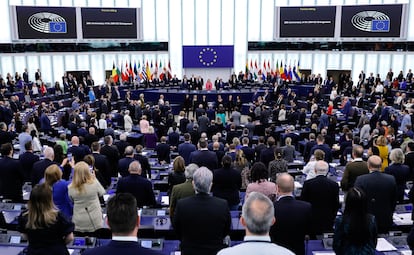EU Parliament approves final set of environmental regulations amid far-right threats to revoke green laws
At the last plenary session before the European elections in June, the radical right promised to repeal the ‘stupid’ laws against climate change

Before dissolving the chamber with applause, goodbyes, hugs and even selfies, the last regulation that the MEPs in Strasbourg approved on Thursday, at their last plenary session before the European elections of June, was the Net Zero Industry Act (NZIA). This piece of legislation to promote clean strategic industries summarizes, to a large extent, the main concerns and disputes of the term that is now ending, and which will also mark the one following the elections: how to continue simultaneously promoting European competitiveness and the green transition, in the midst of growing questions about the European Green Deal by the denialist far right and even by a sector of the traditional right.
The feeling of now-or-never created by the upcoming European elections — where there could be a surge of the far right, which has no qualms about describing climate change as a hoax and the laws to combat it as “stupid,” as some MEPs called them this week — accelerated the negotiation of multiple laws in recent months, largely environmental projects.
Many observers regret that this speed has come at the cost of more concessions than usual that lower the ambition of these regulations, as is the case with the European law that seeks to force large companies to better ensure respect for human rights and the environment across their value chains. The final text of the so-called Corporate Sustainability Due Diligence Directive (CSDDD) that the European Parliament validated this week will end up affecting many fewer companies than initially planned, and its impact will also be lower in sectors that are especially sensitive to environmental violations or child exploitation such as the textile industry, mining, agriculture (including fishing and logging) and construction. These concessions had to be accepted by the MEPs due to the refusal by states to approve the text originally agreed with them, which was more ambitious. A similar pattern has emerged with several environmental regulations, and some bills have been shelved, such as the one that sought to reduce the use of pesticides.
In addition to the zero emissions law and the CSDDD, at this last Strasbourg plenary session MEPs also gave their final approval (pending final ratification by the states) to half a dozen regulations that seek to reduce or mitigate climate change. Among the measures that received legislative approval in recent days was the directive on the “right to repair,” which obliges manufacturers to facilitate the repair of household appliances such as washing machines or vacuum cleaners instead of forcing customers to purchase a new product, thus promoting the circular economy and creating significant savings for consumers.
MEPs also endorsed new measures to improve air quality in the EU, with the goal of halving the main air pollutants by 2030. Likewise, they gave their final approval to one of the regulations that has suffered the most pressure from lobbies in recent years: the new rules to reduce, reuse and recycle packaging that will imply a ban, from 2030, on products such as packaging for fresh, unprocessed fruits and vegetables, food and drinks consumed in cafés and restaurants, or small packaging for personal hygiene products, such as hotel shampoo bottles, as well as individual sachets of condiments or sauces.
An example of the difficult balance in the face of growing questions about the European Green Deal is the approval, also during this plenary session, of the review of the Common Agricultural Policy (CAP) to lower environmental requirements and grant broad exemptions to its compliance. The changes made due to fear of the electoral impact of the farmers’ protests that have multiplied throughout Europe in recent months, and whose discontent the most radical (and not so radical) forces throughout the EU have tried to capitalize on. “This vote shreds the last scraps of credibility that the EU’s farm policy protects the environment and the public interest,” Greenpeace EU agriculture policy director Marco Contiero condemned in a statement.
A key piece of the Green Deal is still in limbo, the Nature Restoration Law (NRL) seeking to protect biodiversity, which has become one of the symbols of the polarization and politicization of environmental measures in the EU for at least a year. The bill that emerged from the difficult procedure in the European Parliament, amidst tremendous clashes and strong concessions, is once again hanging by a thread at the state level, due to the lack of sufficient votes to give it definitive ratification.
What is at stake with the European fight against climate change, if the far right gains enough strength in the European elections in June, was illustrated on Wednesday by Jorge Buxadé, a MEP for the Spanish ultranationalist party Vox: he promised to end the EU’s environmental transition agenda, and crumpled up two sheets of paper with the logos of the European Green Deal and the 2030 Agenda.
“You people are a meme. Of course, we are going to repeal your Green Deal and of course we are going to erase your diabolical 2030 Agenda from history,” the far-right lawmaker promised inside the EU Parliament.
“It has become clear that denialism exists and that it is very strong. It will be up to the people, between June 6 and 9, to ensure they are not the majority in this chamber,” warned the promoter of the Nature Restoration Law, the Socialist MEP César Luena.
Sign up for our weekly newsletter to get more English-language news coverage from EL PAÍS USA Edition
Tu suscripción se está usando en otro dispositivo
¿Quieres añadir otro usuario a tu suscripción?
Si continúas leyendo en este dispositivo, no se podrá leer en el otro.
FlechaTu suscripción se está usando en otro dispositivo y solo puedes acceder a EL PAÍS desde un dispositivo a la vez.
Si quieres compartir tu cuenta, cambia tu suscripción a la modalidad Premium, así podrás añadir otro usuario. Cada uno accederá con su propia cuenta de email, lo que os permitirá personalizar vuestra experiencia en EL PAÍS.
¿Tienes una suscripción de empresa? Accede aquí para contratar más cuentas.
En el caso de no saber quién está usando tu cuenta, te recomendamos cambiar tu contraseña aquí.
Si decides continuar compartiendo tu cuenta, este mensaje se mostrará en tu dispositivo y en el de la otra persona que está usando tu cuenta de forma indefinida, afectando a tu experiencia de lectura. Puedes consultar aquí los términos y condiciones de la suscripción digital.









































